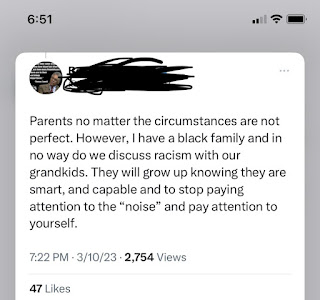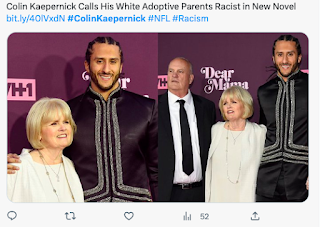Recently, Colin Kaepernick released a memoir in he style of a graphic novel, a really interesting approach to the genre. In the book, he depicts his life growing up in an adoptive, multiracial family, his football career, and his activism. Of course, because it's Kaepernick, the ignorant Twitter users, or Twignorants, went crazy, especially because he discussed some of the nuances of growing up Black in a white family. Observe just a few of the highlights:
There's this guy with the helpfully telling Thomas Sowell quote in the profile pic that refuses to discuss racism with his Black grandkids, but expects them to ignore the "noise" of the racism he doesn't discuss with them.
Or this one, who quickly dismisses the Black user affirming Kaepernick's experience and completely misses the context of "shut up and dribble." Also, why are some of them so obsessed with purple people. Is there a Grimace fan club I don't know about?
This guy is incensed, livid, I tell you, over the cowardice it takes to openly discuss the racial conflicts in one's own family, especially when Kaepernick's parents risked public ridicule just for adopting him. But why would they be ridiculed? Surely, there couldn't have been any prejudice among their peers and social circles?
Or this retweet of another clickbait article on the topic with a catchy title. The only problems are 1) A slight misunderstanding of what a novel is, and 2) the fact that Kaepernick did not in fact call his parents racist.
Thankfully, there were also several comments like this one, either from Black children of white adoptive parents who shared some of their own difficulties growing up, or white adoptive parents of Black children sharing the ways they have grown and learned through the process of raising their kids.
So, do I think that it was "problematic," to use Kaepernick's word, for his mother to tell him he would look like a "thug" with cornrows? Do I think that her words were motivated by a race prejudice, an inclination, planted in her by her upbringing and environment, to perceive Black boys and men in a negative or dangerous light? Yes, to both questions. But do I think that she was also doing her dead level best to raise a son who would have a good reputation and safe passage in a neighborhood that probably shared those same prejudices? Absolutely, yes. It's because I know that people and their motivations are complex that I can both critique her words and actions, but empathize with her intentions. For all I know, her words may have been motivated by love and concern for her son's safety, made all the more powerful by the knowledge that many people in their society will see her beloved son as a threat and a menace if he fails to live up to every single tenet of the racial policies of respectability. In fact, I'm sure that's where her heart was, just as I'm sure that she both knows and fears this danger because it lives in her own heart, too, inexplicably and problematically intertwined with her love for her son.
If that seems crazy, consider the dozens of reasons why people might choose to adopt a child, and add to that math the specific reasons one might choose to adopt outside of their own race. In the complexity of the human experience, there could be a hundred reasons. Now, as a thought experiment, try to think of at least two reasons, out of so many, that might be problematic, or even stemming from prejudice or racism. They really do exist.
Or, on another note, try the same thought process with interracial marriage. Among the dozens of reasons why people choose a marriage, at least a few must be problematic. So then it follows that adopting a child from another race, or marrying a spouse from another race, does not exempt one from prejudice, or somehow prove that the parent or spouse is somehow immune to racism.
If anything, these special, complicated, and beautiful relationships can be crucibles on which one's prejudices, however latent or subconscious, can be exposed and purged. Raising kids in a multicultural home can be hard. Beautiful, but hard. Mistakes get made, but also lessons get learned.
For this reason, another thing I'm sure of, even more than the idea that Kaepernick's mother simultaneously had the best of intentions and the most problematic of tactics, is that she is not in the same head space she was when her son was a preteen, rebelling like they all do and trying to redefine himself with hairstyles and other outward changes. I guarantee that Kaepernick had her full permission to share that intimate and challenging story with the world, probably in an effort to help mixed, blended, and adoptive families everywhere. This is what is so wrong about all the knee-jerk, defensive, and outright racist comments accusing Kaepernick of somehow betraying or embarrassing his family. He seems to genuinely love and cherish his parents, flaws and all. His criticisms of their worst moments seem to come from a place of healing and hope, but that gets lost in the cacophony of hate and backlash against his message. In fact, the fiery nature of the backlash makes me wonder if the loudest of the trolls are really defending Kaepernick's parents at all, or whether they're really defending themselves.





